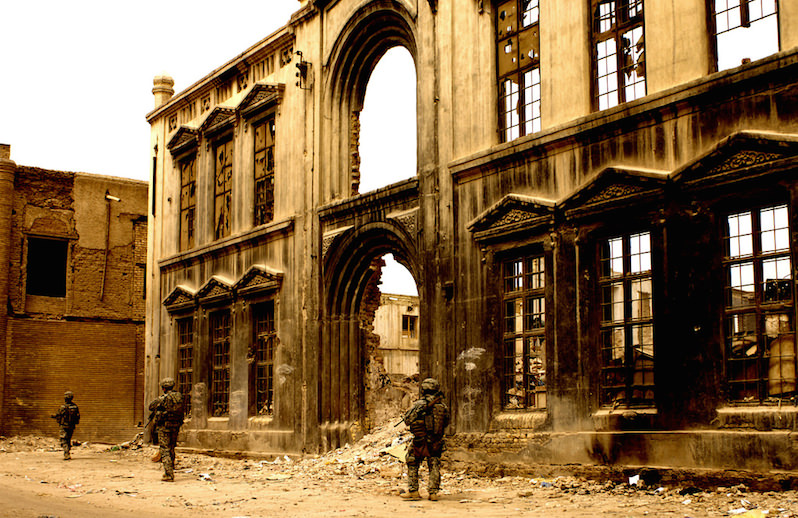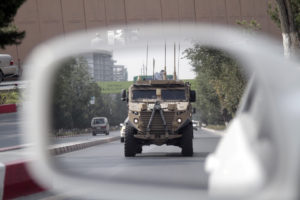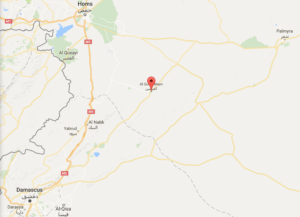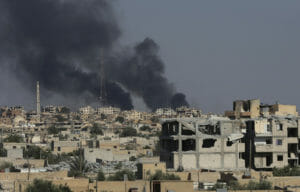How to Lose the Next War in the Middle East
The short answer: Fight it. U.S. soldiers on patrol in Baghdad in 2008. (U.S. Army / CC 2.0)
U.S. soldiers on patrol in Baghdad in 2008. (U.S. Army / CC 2.0)
By Danny Sjursen / TomDispatchEditor’s note: The views expressed in this article are those of the author, expressed in an unofficial capacity, and do not reflect the official policy or position of the Department of the Army, Department of Defense, or the U.S. government.
Make no mistake: after 15 years of losing wars, spreading terror movements, and multiplying failed states across the Greater Middle East, America will fight the next versions of our ongoing wars. Not that we ever really stopped. Sure, Washington traded in George W. Bush’s expansive, almost messianic attitude toward his Global War on Terror for Barack Obama’s more precise, deliberate, even cautious approach to an unnamed version of the same war for hegemony in the Greater Middle East. Sure, in the process kitted-up 19 year-olds from Iowa became less ubiquitous features on Baghdad’s and Kabul’s busy boulevards, even if that distinction was lost on the real-life targets of America’s wars — and the bystanders (call them “collateral damage”) scurrying across digital drone display screens.
It’s hardly a brilliant observation to point out that, more than 15 years later, the entire region is a remarkable mess. So much worse off than Washington found it, even if all of that mess can’t simply be blamed on the United States — at least not directly. It’s too late now, as the Trump administration is discovering, to retreat behind two oceans and cover our collective eyes. And yet, acts that might still do some modest amount of good (resettling refugees, sending aid, brokering truces, anything within reason to limit suffering) don’t seem to be on any American agenda.
So, after 16 years of inconclusive or catastrophic regional campaigns, maybe it’s time to stop dreaming about how to make things better in the Greater Middle East and try instead to imagine how to make things worse (since that’s the path we often seem to take anyway). Here, then, is a little thought experiment for you: what if Washington actually wanted to lose? How might the U.S. government go about accomplishing that? Let me offer a quick (and inevitably incomplete) to-do list on the subject:
As a start, you would drop an enlarged, conventional army into Iraq and/or Syria. This would offer a giant red, white, and blue target for all those angry, young radicalized men just dying (pardon the pun) to extinguish some new “crusader” force. It would serve as an effective religious-nationalist rallying cry (and target) throughout the region.
Then you would create a news-magnet of a ban (or at least the appearance of one) on immigrants and visitors of every sort from predominantly Muslim countries coming to the United States. It’s hardly an accident that ISIS has taken to calling the president’s proposed executive order to do just that “the blessed ban” and praising Donald Trump as the “best caller to Islam.” Such actions only confirm the extremist narrative: that Muslims are unwelcome in and incompatible with the West, that liberal plurality is a neo-imperial scam.
Finally, you would feed the common perception in the region that Washington’s support for Israel and assorted Arab autocrats is unconditional. To do so, you would go out of your way to hold fawning public meetings with military strongmen like Egyptian President Abdel Fattah al-Sisi, and suggest that, when it came to Israel, you were considering changing American policy when it comes to a two-state solution and the illegal Israeli settlements in Palestine. Such policies would feed another ISIS narrative: U.S. support for illiberal despots and the failure of the Arab Spring is proof that practicing Muslims and peaceful Islamists will never successfully gain power through the democratic process.
Key to such a losing strategy would be doing anything you could to reinforce ISIS’s twisted narrative of an end-of-days battle between Islam and Christendom, a virtuous East versus a depraved West, an authentic Caliphate against hypocritical democracies. In what amounts to a war of ideas, pursuing such policies would all but hand victory to ISIS and other jihadi extremist groups. And so you would have successfully created a strategy for losing eternally in the Greater Middle East. And if that was the desired outcome in Washington, well, congratulations all around, but of course we all know that it wasn’t.
Let’s take these three points in such a losing strategy one by one. (Of course “losing” is itself a contested term, but for our purposes, consider the U.S. to have lost as long as its military spins its wheels in a never-ending quagmire, while gradually empowering various local “adversaries.”)
Just a Few Thousand More Troops Will Get It Done …
There are already thousands of American soldiers and Marines in Iraq and Syria, to say nothing of the even more numerous troops and sailors stationed on bases in Kuwait, Bahrain, Turkey, and other states ringing America’s Middle Eastern battlefields. Still, if you want to mainline into the fastest way to lose the next phase of the war on terror, just blindly acquiesce in the inevitable requests of your commanders for yet more troops and planes needed to finish the job in Syria ( and Iraq, and Afghanistan, and Yemen, and so on).
Let’s play this out. First, the worst (and most plausible) case: U.S. ground forces get sucked into an ever more complex, multi-faceted civil war — deeper and deeper still, until one day they wake up in a world that looks like Baghdad, 2007, all over again.
Or, lest we be accused of defeatism, consider the best case: those endlessly fortified and reinforced American forces wipe the floor with ISIS and just maybe manage to engineer the toppling of Bashar al-Assad’s Syrian regime as well. It’s V-Day in the Middle East! And then what? What happens the day after? When and to whom do American troops turn over power?
● The Kurds? That’s a nonstarter for Turkey, Iran, and Iraq, all countries with significant Kurdish minorities.
● The Saudis? Don’t count on it. They’re busy bombing Houthi Shias in Yemen (with U.S.-supplied ordnance) and grappling with the diversification of their oil-based economy in a world in which fossil fuels are struggling.
● Russia? Fat chance. Bombing “terrorists”? Yes. Propping up an autocratic client to secure basing rights? Sure. Temporary transactional alliances of convenience in the region? Absolutely. But long-term nation-building in the heart of the Middle East? It’s just not the style of Vladimir Putin’s Russia, a country with its own shaky petro-economy.
● So maybe leave Assad in power and turn the country back over to what’s left of his minority, Alawite-dominated regime? That, undoubtedly, is the road to hell. After all, it was his murderous, barrel-bombing, child-gassing acts that all but caused the civil war in the first place. You can be sure that, sooner or later, Syria’s majority Sunni population and its separatist Kurds would simply rebel again, while (as the last 15 years should have taught us) an even uglier set of extremists rose to the surface.
Keep in mind as well that, when it comes to the U.S. military, the Iraqi and Afghan “surges” of 2007 and 2009 offered proof positive that more ground troops aren’t a cure-all in such situations. They are a formula for expending prodigious amounts of money and significant amounts of blood, while only further alienating local populations. Meanwhile, unleashing manned and drone aircraft strikes, which occasionally kill large numbers of civilians, only add to the ISIS narrative.
Every mass casualty civilian bombing or drone strike incident just detracts further from American regional credibility. While both air strikes and artillery barrages may hasten the offensive progress of America’s Kurdish, Iraqi, and Syrian allies, that benefit needs to be weighed against the moral and propaganda costs of those dead women and children. For proof, see the errant bombing strike on an apartment building in Mosul last month. After all, those hundred-plus civilians are just as dead as Assad’s recent victims and just as many angry, grieving family members and friends have been left behind.
In other words, any of the familiar U.S. strategies, including focusing all efforts on ISIS or toppling Assad, or a bit of both, won’t add up to a real policy for the region. No matter how the Syrian civil war shakes out, Washington will need a genuine “what next” plan. Unfortunately, if the chosen course predictably relies heavily on the military lever to shape Syria’s shattered society, America’s presence and actions will only (as in the past) aggravate the crisis and help rejuvenate its many adversaries.
“The Blessed Ban”
The Trump administration’s proposed “travel ban” quickly became fodder for left-versus-right vitriol in the U.S. Here’s a rundown on what it’s likely to mean when it comes to foreign policy and the “next” war. First, soaring domestic fears over jihadi terror attacks in this country and the possible role of migrants and refugees in stoking them represent a potentially catastrophic over-reaction to a modest threat. Annually, from 2005 to 2015, terrorists killed an average of just seven Americans on U.S. soil. You are approximately 18,000 times more likely to die in some sort of accident than from such an attack. In addition, according to a study by the conservative Cato Institute, from 1975 to 2015 citizens of the countries included in Trump’s first ban (including Iraq and Syria) killed precisely zero people in the United States. Nor has any refugee conducted a fatal domestic attack here. Finally, despite candidate and President Trump’s calls for “extreme vetting” of Muslim refugees, the government already has a complex, two-year vetting process for such refugees which is remarkably “extreme.”
Those are the facts. What truly matters, however, is the effect of such a ban on the war of ideas in the Middle East. In short, it’s manna from heaven for ISIS’s storyline in which Americans are alleged to hate all Muslims. It tells you everything you need to know that, within days of the administration’s announcement of its first ban, ISIS had taken to labeling it “blessed,” just as al-Qaeda once extolled George W. Bush’s 2003 “blessed invasion” of Iraq. Even Senator John McCain, a well-known hawk, worried that Trump’s executive order would “probably give ISIS some more propaganda.”
Remember, while ISIS loves to claim responsibility for every attack in the West perpetrated by lost, disenfranchised, identity-seeking extremist youths, that doesn’t mean the organization actually directs them. The vast majority of these killers are self-radicalized citizens, not refugees or immigrants. One of the most effective — and tragic — ways to lose this war is to prove the jihadis right. The Hypocrisy Trap
Another way to feed the ISIS narrative is to bolster perceptions of diplomatic insincerity. Americans tend to be some of the least self-aware citizens on the planet. (Is it a coincidence that ours is about the only population left still questioning the existence of climate change?) Among the rare things that Democrats and Republicans agree on, however, is that America is a perennial force for good, in fact the force for good on Earth. As it happens, the rest of the world begs to differ. In Gallup global polls, the United States has, in fact, been identified as the number one threat to world peace! However uncomfortable that may be, it matters.
One reason many Middle Easterners, in particular, believe this to be so stems from Washington’s longstanding support for regional autocrats. In fiscal year 2017, Egypt’s military dictator and Jordan’s king will receive $1.46 and $1 billion respectively in U.S. foreign aid — nearly 7% of its total assistance budget. After leading a coup to overturn Egypt’s elected government, General Sisi was officially persona non grata in the White House (though President Obama reinstated $1.3 billion in military aid in 2015). Sisi’s recent visit to the Trump White House changed all that as, in a joint press conference, the president swore that he was “very much behind” Egypt and that Sisi himself had “done a fantastic job.” In another indicator of future policy, the State Department dropped existing human rights conditions for the multibillion-dollar sale of F-16s to Bahrain’s monarchy. All of this might be of mild interest, if it weren’t for the way it bolstered ISIS claims that democracy is just an “idol,” and the democratic process a fraud that American presidents simply ignore.
Then there’s Israel, already the object of deep hatred in the region, and now clearly about to receive a blank check of support from the Trump administration. The role that Israeli leaders already play in American domestic politics is certainly striking to Arab audiences. Consider how unprecedented it was in 2015 to see Israeli Prime Minister Benjamin Netanyahu criticize a sitting president before a joint session of Congress in an Israeli election year and receive multiple, bipartisan standing ovations. Even so, none of this prevented the Obama administration, domestically labeled “weak on Israel,” from negotiating a record $38 billion military aid deal with that country.
While violent Palestinian fighters are far from blameless, for 40 years Israel has increasingly created facts on the ground meant to preclude a viable Palestinian state. Netanyahu and his predecessors increased illegal settlements in the Palestinian territories, built an exclusion wall, and further divided the West Bank by constructing a network of roads meant only for the Israeli military and Jewish settlers.
Although most world leaders, publics, and the United Nations see the Jewish settlements on the West Bank as a major impediment to peace, the current U.S. ambassador to Israel was once the president of a fundraising group supporting just such an Israeli settlement. The notion that he could be an honest broker in peace talks borders on the farcical.
All of this, of course, matters when it comes to Washington’s unending wars in the region. Even Secretary of Defense James Mattis, soon after leaving the helm of U.S. Central Command (CENTCOM), recognized that he “paid a military security price every day as a commander of CENTCOM because the Americans were seen as biased in support of Israel.” So, you want to lose? Keep feeding the ISIS narrative on democracy and Israel just as the Trump administration is doing, even as it sends more troops into the region and heightens bombing and drone raids from Syria to Yemen.
Send in the Cavalry
If the next phase of the generational struggle for the Middle East is once again to be essentially a military one, while the Trump administration feeds every negative American stereotype in the region, then it’s hard to see a future of anything but defeat. A combination of widespread American ignorance and the intellectual solace of simplistic models lead many here to ascribe jihadist terrorism to some grand, ethereal hatred of “Christendom.”
The reality is far more discomfiting. Consider, for instance, a document from “ancient” history: Osama bin Laden’s 1998 fatwa against the United States. At that time, he described three tangible motives for jihad: U.S. occupation of Islam’s holiest lands in the Middle East, U.S. attacks on and sanctions against Iraq, and American support for Israel’s “occupation” of Jerusalem. If ISIS and al-Qaeda’s center of gravity is not their fighting force but their ideology (as I believe it is), then the last thing Washington should want to do is substantiate any of these three visions of American motivation — unless, of course, the goal is to lose the war on terror across the Greater Middle East and parts of Africa.
In that case, the solution is obvious: Washington should indeed insert more troops and set up yet more bases in the region, maintain unqualified support for right-wing Israeli governments and assorted Arab autocrats, and do its best to ban Muslim refugees from America. That, after all, represents the royal road to affirming al-Qaeda’s, and now ISIS’s, overarching narratives. It’s a formula — already well used in the last 15 years — for playing directly into the enemy’s hands and adhering to its playbook, for creating yet more failed states and terror groups throughout the region.
When it comes to Syria in particular, there are some shockingly unexamined contradictions at the heart of Washington’s reactions to its war there. President Trump, for instance, recently spoke emotionally about the “beautiful babies cruelly murdered” in Idlib, Syria. Yet, the administration’s executive order on travel bans any Syrian refugees — including beautiful babies — from entering this country. If few Americans recognize the incongruity or hypocrisy of this, you can bet that isn’t true in the Arab world.
For ISIS, today’s struggle in Syria, Iraq, and elsewhere is part of an unremitting, apocalyptic holy war between Islam and the West. That narrative is demonstrably false. The current generation of jihadis sprang from tangible grievances and perceived humiliations perpetrated by recent Western policies. There was nothing “eternal” about it. The first recorded suicide bombings in the Middle East didn’t erupt until the early 1980s. So forget the thousand-year struggle or even, in Western terms, the “clash of civilizations.” It took America’s military-first policies in the region to generate what has now become perpetual war with spreading terror insurgencies.
Want a formula for forever war? Send in the cavalry … again.
Major Danny Sjursen, a TomDispatch regular, is a U.S. Army strategist and former history instructor at West Point. He served tours with reconnaissance units in Iraq and Afghanistan. He has written a memoir and critical analysis of the Iraq War, Ghost Riders of Baghdad: Soldiers, Civilians, and the Myth of the Surge. He lives with his wife and four sons near Fort Leavenworth, Kansas.
Follow TomDispatch on Twitter and join us on Facebook. Check out the newest Dispatch Book, John Feffer’s dystopian novel Splinterlands, as well as Nick Turse’s Next Time They’ll Come to Count the Dead, and Tom Engelhardt’s latest book, Shadow Government: Surveillance, Secret Wars, and a Global Security State in a Single-Superpower World.
Copyright 2017 Danny Sjursen
Your support matters…Independent journalism is under threat and overshadowed by heavily funded mainstream media.
You can help level the playing field. Become a member.
Your tax-deductible contribution keeps us digging beneath the headlines to give you thought-provoking, investigative reporting and analysis that unearths what's really happening- without compromise.
Give today to support our courageous, independent journalists.







You need to be a supporter to comment.
There are currently no responses to this article.
Be the first to respond.